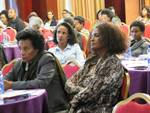Africa Rising: Promise or Challenge for Gender Equality?
Published on Mon, 2015-06-01 10:00
Development Alternatives with Women for a New Era (DAWN) together with the Network of Ethiopian Women’s Associations (NEWA) organized a Public Forum on “Africa Rising: Promise or Challenge for gender equality?” in Addis Ababa on Friday, May 29, 2015 at the Harmony Hotel. The Forum included a panel discussion on the topic, as well as the launch of DAWN’s new book, The Remaking of Social Contracts: Feminists in a Fierce New World (Zed Publications, 2014) and a special issue of the journal, Global Public Health, titled “Sexual and Reproductive Health and Rights for the next decades: what’s been achieved? What lies ahead?”. The special issue of the journal was published in early 2015. DAWN’s Board Chair, Dr Claire Slatter, and NEWA’s Executive Director, Saba Gebremedhin, welcomed the audience and set the stage by explaining why ‘Africa Rising’ is an important subject for feminists, their allies, and policy makers to understand and debate. The panel discussants were Professor Takyiwaa Manuh, Director, Division of Social Development Policy (DSDP), UNECA; Ruth Nyambura of Agrarian Transformation(s) in Africa (ATA); Nicole Bidegain Ponte, DAWN Executive Committee Member; and Professor Gita Sen, DAWN General Coordinator. The panel was moderated by Zenebework Tadesse, DAWN Board member. The two African speakers provided a sharp critique of the idea of “Africa Rising”, pointing to its origins in an increasingly discredited neoliberal paradigm with its emphasis on trickle-down growth. The hype around recent growth rates in Africa does not sufficiently address the implications of a pattern of growth that is deeply dependent on the export of primary commodities, that gives short shrift to job creation and investment in human development, underplays rising inequality and social tensions and conflicts, and pays lip service to gender equality and women’s human rights. As Professor Manuh said, drawing on data thrown up by the ECA’s African Social Development Index and the “Cost of Hunger” study, “Yes, Africa is rising, but for whom?” Ruth Nyambura’s presentation focused particularly on the challenges to food security and the sustainability of smallholder production, largely by women. These challenges are the result of current policies that continue to allow land grabbing, and do not support the region’s women farmers who are the main food producers. Ironically, in the name of support for agricultural investment, policies such as those promoted by the G-8 supported New Alliance for Food Security and Nutrition in Africa, have ended up subsidizing investment in tractors that are rarely used by smallholders. She highlighted the damage caused by other policies such as those that prevent local farmers from saving their own seeds, and force them instead to become dependent for seeds on large agro – multinationals such as Monsanto. Nicole Bidegain’s reflections on the lessons learned from recent development experiences in Latin America showed how a gender lens can challenge given narratives, even progressive ones. While she agreed that strong governmental interventions for poverty reduction and social policies had reduced income poverty significantly, these advances have not been without costs. Conditional cash transfers, while contributing to income poverty reduction, have also tended to worsen women’s “time poverty” by increasing their work burdens. There has been a renewed dependence on the exports of primary commodities and extractive industries under a TINA (there is no alternative) belief that it is the only way to fund social sector spending. And there seems to be a race to the bottom on taxation, as governments vie with each other to be attractive to investment. Thus, the recent Latin American experience may be more mixed and should be studied more closely from a gender perspective. Gita Sen drew three main lessons from Asian development experiences, especially of the high economic growth countries. She pointed out that the experiences show different mixes of linkages between economic growth, inequality, human development, environmental sustainability, human rights and social justice, especially gender equality and women’s human rights. The first lesson is the great importance of balance in policies – between internal market versus exports, secondary /tertiary versus primary sectors, agriculture versus industry / services, SMEs versus large enterprises, and public versus private sectors, if development is to be truly sustainable. While many of the high growth Asian countries have also had high human development, there have also been many gaps and policy limitations where inequality, environmental sustainability, and human rights are concerned. These chickens, as she said, usually come home to roost. The second lesson is, thus, that the policy gaps of today almost always become the constraints of the next phase. And the third critical lesson is that, because of gender inequality, oppression and subordination, those policy gaps and constraints often hit girls and women especially hard. There was a rich discussion among the 60 or so participants in the Forum, and a strong feeling that inter-regional experiences such as this one are especially valuable in learning from each other’s experiences and histories. The discussion also stressed the need for social mobilizing so that dominant narratives can be effectively challenged and transformed. The final part of the evening was a perceptive and thoughtful review of DAWN’s new book and the Special Issue of the journal by Sehin Teferra, chair and co-founder of the Ethiopian feminist network, Setaweet. Source: DAWN. Tags: |


